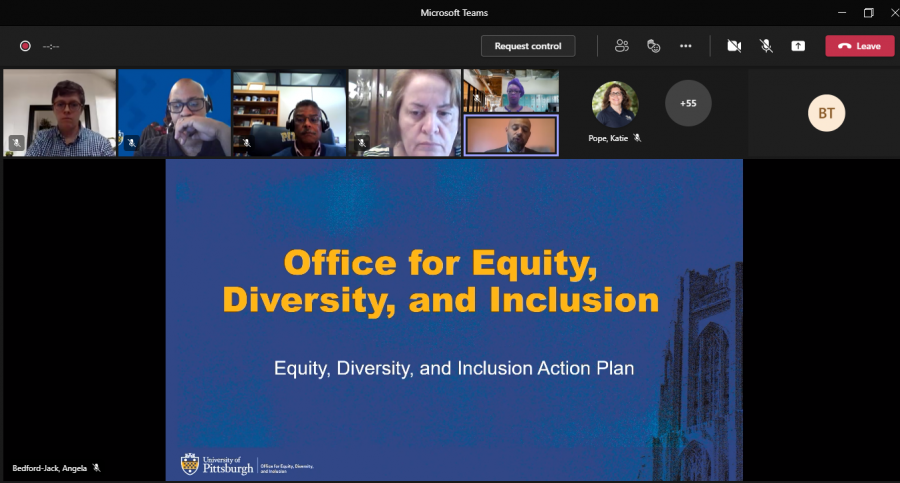Equity, Diversity and Inclusion Tactical Plan town hall outlines Pitt’s diversity goals and strategies
The Equity, Diversity and Inclusion Tactical Plan virtual town hall on Wednesday outlined the University’s diversity goals.
October 18, 2021
Ron Idoko said the Office of Equity, Diversity and Inclusion is working to establish an official land acknowledgement — a formal acknowledgement that Pitt is currently occupying land that belongs to Indigenous communities — for all Pitt campuses as part of its Equity, Diversity and Inclusion Tactical Plan.
“We’ve been working diligently to attempt to get one fashioned. We are trying our best to establish meaningful relationships with members of the Indigenous community in our region so that we can ensure an authentic statement that has their input,” Idoko, the diversity and multicultural program manager at OEDI, said.
Idoko discussed the land acknowledgement at the Equity, Diversity and Inclusion Tactical Plan virtual town hall last Wednesday. Pitt established the tactical plan to help outline and fulfill diversity goals such as creating an equitable and inclusive campus environment, as outlined in the Plan for Pitt. Clyde Wilson Pickett, vice chancellor for Equity, Diversity and Inclusion, said Pitt will release the plan after the OEDI receives feedback from various members of the office.
For the land acknowledgement, Pickett said the OEDI is working with the Heinz History Center to identify the Native Nations on which Pitt’s campuses reside to ensure “we give the appropriate acknowledgement for different places.”
Idoko added that the University is working on events for Native American Heritage Month, which takes place next month. He encouraged people to submit their ideas for programs to OEDI.
“November is Native American Heritage Month, and certainly we want to further expand our consciousness on the Indigenous folks who resided in our community and certainly learn more about Indigenous culture during that time,” Idoko said.
At the town hall, Pickett also touched on various aspects of the tactical plan. He said it will focus on three pillars — creating an equitable campus climate, diverse community development and equity-focused campus ethos — to promote and implement diversity, equity and inclusion initiatives.
“We’ve continued to amplify how we lead and confront systemic inequity, and how we become a more anti-racist institution, and how we prioritize social justice, or multicultural social justice,” Pickett said.
Pickett said the three pillars of focus will allow the University to create an inclusive and diverse community, promote critical thinking through a racial equity lens and help further strategize and plan DEI work at Pitt. He said the goal of the tactical plan is to first start a conversation around Pitt’s DEI goals and then create strategies and guidelines that allow for those goals to be properly implemented.
“Our goal to be an inclusive community is to encompass those things, the priority of how we develop that academic, equity-focused ethos is a part of the conversation, and more specifically, how we think about all of these components being interwoven or connected together,” Pickett said. “The equitable campus climate, more specifically, focusing on a sense of belonging, and then that diverse community development piece, in other words, retaining, developing and affirming.”
He added that in terms of diversity, the University hopes to create a space for individuals to share their experiences and improve engagement between diverse groups.
“Diversity is the shared differences in terms of personal group and characteristic that human beings have and how they come together and how we prioritize the understanding of those individual and unique differences,” Pickett said. “We’ll continue to amplify the importance of using intersectional identity as part of how we assess what it means to be a part of the diverse perspective.”
Pickett said the University plans to release an anti-racism pledge that all Pitt community members would have the opportunity to take. He said the pledge is currently in the works and OEDI will provide more information in the future.
Pickett said establishing a land acknowledgement and an anti-racism pledge is in line with the University’s values — outlined in the Plan for Pitt — which are inclusion, community, academic excellence, collaboration, innovation and sustainability.
“The importance of having an inclusive and equitable campus climate and culture, and specifically the opportunity to foster that environment that prioritizes that inclusive sense of belonging where every stakeholder at the institution is, is welcomed,” Pickett said. “To do so creates a culture that allows the people, the purpose and all of those components of what we seek to accomplish are connected.”
Along with presenting the tactical plan, the town hall also focused on OEDI’s programming for various diversity initiatives, including events for Relationship Violence Awareness Month, National Disability Employment Awareness Month and Native American Heritage Month.
Angie Bedford-Jack, digital accessibility coordinator at OEDI, provided some updates on programming for Relationship Violence Awareness Month on behalf of Carrie Benson, the prevention and education coordinator at OEDI.
Bedford-Jack said these programs include the availability of walk-in hours at Pittsburgh Action Against Rape, the “My Voice Has Power: A Bystander Conversation” virtual event on Tuesday, the Healthy Relationship Fair and upcoming workshops for faculty and staff for supporting survivors of sexual misconduct and preventing and responding to sexual misconduct.








